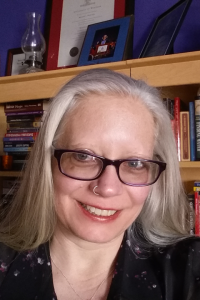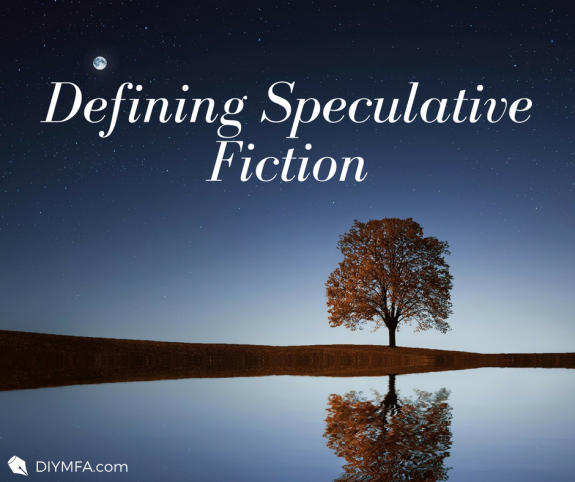Maybe it’s my inner academic, or my inner word nerd, but I have a “thing” for defining terms. If we can’t agree upon what we’re talking about, how can we have a productive conversation? And that’s one of my primary aims with this column: to promote discussion and general thoughtiness with regard to speculative fiction.
Of course, there are other reasons to pin down your genre definitions, and they all boil down to one word: marketing. Now hold on, before you run screaming from your computer, smart phone, or tablet, there’s nothing inherently evil in the M word. It’s more marvelous than malevolent, I assure you, but we’ll get to those juicy details in a bit. Now … onto the definitions!
Fantasy first
Why? Because it’s the easiest of our genres to define. I’m sure you already have a firm grasp on this airy-fairy genre. Just to be sure, though, I’m going to consult our friend, Merriam-Webster.
Definition of fantasy
2 : fancy; especially : the free play of creative imagination
3 : a creation of the imaginative faculty whether expressed or merely conceived: such as
a : a fanciful design or invention – a fantasy of delicate tracery
b : a chimerical or fantastic notion – His plans are pure fantasy.
c : fantasia 1- the organ fantasy of Johannes Brahms
d : imaginative fiction featuring especially strange settings and grotesque characters – spent the summer reading fantasy —called also fantasy fiction
Fantasy is anything you can imagine. You want your mermaids to be descendants of narwhales? Bad-ass, aquatic unicorns, coming up! Seriously. Fantasy is the fiction of the impossible.
Wee caveat here, though. Your aquatic unicorns may not look human, or live in a world that most humans could relate to, but they must behave in a human fashion. Their hopes and dreams, motivations, and loves and losses, if relatable, are what will draw your readers in and keep them coming back for more.
Science fiction
This genre is more hotly contested. We only have to consult the Wikipedia entry on Definitions of Science Fiction to see what various writers and editors in the genre have proposed over the years.
In 1926, Hugo Gernsback, editor of Amazing Stories and the man for whom the Hugo Awards are named, coined the term scientifiction (all due respect, but I’m so glad that didn’t stick). He based his definition on the fiction of the genre writers of the day, H.G. Wells, Jules Verne, and Edgar Allen Poe. He defined scientifiction as “… a charming romance intermingled with scientific fact and prophetic vision …”[1]
Subsequent offerings from Robert Heinlein, John W. Campbell Jr., Theodore Sturgeon, James Blish, Brian Aldiss, Ray Bradbury, Isaac Asimov, Kim Stanley Robinson, Arthur C. Clark, and Orson Scott Card were all more or less successful in adding something to Gernsback’s definition. Something all agree upon, though, is that scientific theory and technology form the basis of science fiction.
Because of the emphasis on science and technology, some writers view science fiction as a more plot-based genre, and it can be, but I find the most enjoyable science fiction in an interweaving of science or technology as plot vehicle, and character development. Sure, Stranger in a Strange Land is about what might happen if a human child were raised by Martians, but it’s Valentine Michael Smith and his journey as he discovers what it is to be human that makes the novel compelling.
What’s speculative fiction, then?
Judith Merril, Canadian author, editor, and activist, defined speculative fiction in 1966: “… stories whose objective is to explore, to discover, to learn, by means of projection, extrapolation, analogue, hypothesis-and-paper-experimentation, something about the nature of the universe, of man, or ‘reality’…”[2]
Sounds a lot like science fiction, doesn’t it?
Today, speculative fiction serves as an umbrella under which are gathered not only science fiction, but also fantasy, horror, magic realism, alternate history, various -punks, weird fiction, and superhero fiction. Literary writers who embrace the supernatural have also embraced the term speculative fiction as a means of avoiding identification with the more commercial genres of science fiction and fantasy.
After all of that, I’m going to trot out what I think are the simplest, and yet most elegant of the definitions for fantasy and science fiction I’ve yet encountered. In 1962, Rod Serling said, “Fantasy is the impossible made probable. Science Fiction is the improbable made possible.”[3]
The big “why?” and the M word
I said that knowing and understanding your genre is important because marketing. Don’t go anywhere, please. Bear with me for another minute. That nasty M word? It’s all about connecting your story with readers who are going to love it. In my opinion, a work of fiction isn’t complete until it’s in the hands of a reader to whom it speaks. Novels want to be read.
When you write, you’re generally writing to or for someone, even if that someone is you. That point is nothing to sniff at. There are over 7.5 billion people on this planet. You can’t be unique. If 1% of the world population shares your taste in reading material, that’s 75,000 people. You don’t even need that many.
Back in 2008, Kevin Kelly wrote a blog post titled 1,000 true fans, and the gist is that, if you can find 1,000 people who love your work, you have a tribe who will proselytize on your behalf. Word of mouth remains the most powerful method of sales and marketing.
If you want to go the traditional publishing route, you have to identify who among the sea of literary agents represents the genre you write. A query letter is a sales and marketing tool. Once you’ve sold an agent on your novel’s premise and converted them into one of your 1,000 true fans, your agent will make use of your query, tailoring it to particular editors, to find your novel a publisher.
It doesn’t stop there, either. The publisher’s internal sales and marketing team will take their turn and get your novel placed on the shelves of book stores and in libraries. How do those book stores decide where to shelve your novel? Yup. By genre. The science fiction and fantasy sections of most book stores are side by side. Some even shelve them together in one section.
Genre will influence cover and interior design. Yes, each genre has its own aesthetic.
Readers of fantasy and science fiction will head directly to those sections to browse. You increase your chances of discoverability if your novel is shelved alongside their favorite author’s.
If you decide to self-publish, you still have to choose which genre and category to place your novel in, which keywords to select, so that your novel can be prominently placed in the catalogs of Amazon, Kobo, and other online retailers.
One way or the other, knowing your genre is the key to getting your novel into a reader’s hands and that, my friends, is powerful ju-ju.
[1] Originally published in the April 1926 issue of Amazing Stories.
[2] Originally published in the May 1966 issue of Extrapolation.
[3] Rod Serling (1962-03-09). The Twilight Zone, “The Fugitive”.
 Melanie Marttila creates worlds from whole cloth. She’s a dreamsinger, an ink alchemist, and an unabashed learning mutt. Her speculative short fiction has appeared in Bastion Science Fiction Magazine, On Spec Magazine, and Sudbury Ink. She lives and writes in Sudbury, Ontario, Canada, where she spends her days working as a corporate trainer. She blogs at https://www.melaniemarttila.ca and you can find her on Facebook and Twitter.
Melanie Marttila creates worlds from whole cloth. She’s a dreamsinger, an ink alchemist, and an unabashed learning mutt. Her speculative short fiction has appeared in Bastion Science Fiction Magazine, On Spec Magazine, and Sudbury Ink. She lives and writes in Sudbury, Ontario, Canada, where she spends her days working as a corporate trainer. She blogs at https://www.melaniemarttila.ca and you can find her on Facebook and Twitter.







